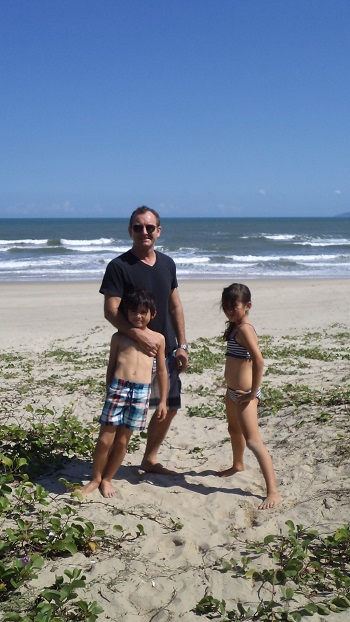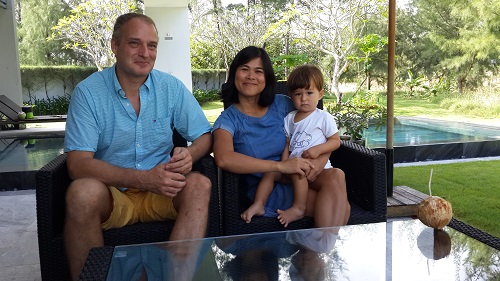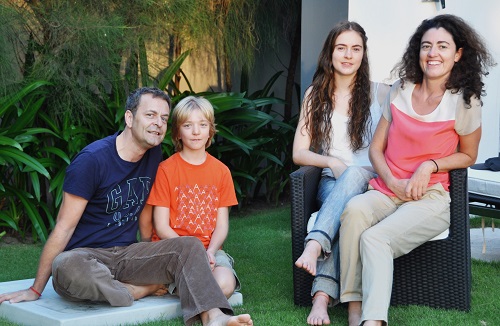The lucky few
Da Nang receives increasing numbers of foreign visitors each year, and tourism is one of the key sectors of the local economy. However, especially over the past decade of rapid development, Da Nang has also attracted many foreigners, often with their families, who have made the city their home. Usually it is a particular job which brings them here, providing the expertise which has helped Da Nang's development – managing projects and tourism developments, teaching English, or working for an NGO or FDI company. Why do they choose Da Nang and what do they enjoy about their new lifestyles in this booming city?
Here is a selection of examples of foreign expats currently living in the city. They have been kind enough to tell their stories to DNT reporters.
 |
| David, Inca and Oskar |
David McCormick, with his children Inca (9) and Oskar (7), moved his home from Ko Samui, Thailand, to Da Nang 6 months ago after having visited the city many times in the recent past. He is an architect and the founder/owner of award-winning architectural design company M-system, which operates out of Ko Samui. His company designed the Novotel on Bach Dang and the clubhouse for the soon-to-open Ba Na golf course, plus several high-rise buildings in Ho Chi Minh City and Ha Noi. With his work expanding rapidly in Viet Nam, including designs for 2 new resorts on Phu Quoc and a second castle at Ba Na, David decided to set up a new office here and oversee it himself whilst leaving his Ko Samui office in the capable hands of a trusted manager.
Originally from the UK, David has also previously lived and worked in South Africa, Hong Kong and China. So how does he feel about his latest relocation, and do his children agree? Certainly Inca and Oskar seem to have settled in well. They attend the Singapore International School where they have quickly made friends with children of many different nationalities. They say that the things they enjoy the most in Da Nang are the beaches, the cinemas, visiting the Dragon Bridge at night and watching it breathe fire and water, Fantasy Park at Ba Na, and the VinCom ice skating rink. Both of them have surfing lessons, and after only a few lessons are much better surfers than their dad! Oskar loves to play football at the Tien Son sports centre, while Inca loves to write stories and dreams of becoming an author. Their favourite Vietnamese food is spring rolls and they love the seafood, especially squid.
Their dad David was the instigator behind the move to Da Nang. The need to be based in Viet Nam was obvious, but he says that he was attracted to Da Nang rather than Ho Chi Minh City or Ha Noi because of its location alongside one of the world's most beautiful beaches and the breathtaking beauty of the Han River and the lush mountains nearby. He reports that setting up his business in Da Nang was time consuming but not difficult. When asked about any advice he would like to give Da Nang, he said "Stop building high-rise hotels so near the beaches on the eastern side of the city because they will block the afternoon sun from the beaches – tourists expect to be able to sunbathe on the beach all day long!". He also advises that beachfront hotels without large windows or balconies are wasting an opportunity to allow guests to enjoy the great sea views.
 |
| Ivo, Nhat and Tim |
The Buchmanns are another family who don't regret their decision to move to Da Nang. Business software consultant Ivo was born in Germany, and in 2000 he and a partner started their own business in Munich – B2invest. As their customer base grew, they needed to expand but it was becoming ever more difficult to recruit sufficient suitably qualified staff, so they decided to expand abroad. Southeast Asia seemed to offer the best future potential and, having checked out several countries in the region, they decided that Viet Nam was the solution, especially as it allowed companies to be 100% foreign-owned. Ivo took on the task, leaving his partner to run the German operation.
But where in Viet Nam should he locate? He decided on Nha Trang because, although he knew he would have to train his new staff, at least there was a university there and he knew that many graduates would be seeking work in their home area rather than having to move away. The Nha Trang office opened in 2011 and it currently employs 10 staff.
Ivo met and married Nhat, whose family home is 50km outside Nha Trang, and they now have a 20-month-old son called Tim. In 2014 they decided to leave Nha Trang and relocate to Da Nang for a better lifestyle. Their comparison of Da Nang and Nha Trang is very interesting.
Ivo says "Nha Trang was being developed very quickly – perhaps too quickly – so there was a lot of construction going on and the infrastructure didn't seem to be improving at the same pace. For a foreigner, Nha Trang was starting to feel unpleasant and stressful. In contrast, I was impressed by Da Nang's good urban planning and the way they were managing the growth in a convenient and well-organised way. The natural beauty of Da Nang is a key attraction."
Fortunately Ivo can easily manage his work from home although he is heavily dependant upon good Internet connections as he is in contact with the Nha Trang and Munich offices on a daily basis, and his clients across the world. He says that Da Nang's international airport, with its frequent domestic and expanding international connections, has been another factor in their choice. For example, they have friends in Hong Kong and Macau who can now easily fly directly to visit them.
For Nhat, the move to Da Nang does of course mean she is further away from her family and friends but her mother makes regular visits, often staying for a couple of weeks at a time, and she brings with her some special edible delights from her home area. Nhat comments "Although I enjoy the food culture more in Nha Trang, especially the wider range of street food, I have found the people in the Da Nang markets really friendly and full of character. I think Nha Trang's economy has grown too fast and now most people there have stopped being nice. Even I have been overcharged in Nha Trang many times. Da Nang people seem much more relaxed and honest. For example, once I was driving the car through Da Nang city centre and I couldn't find a particular street. I stopped to ask someone for directions and they took the trouble to lead me to the street on their motorbike!"
The Buchmann family plan to stay in Da Nang and Tim will go to a local international school. He already speaks both Vietnamese and German. Ivo is happy living near a beach because he enjoys swimming in the sea and windsurfing. His only frustration with Da Nang, and Viet Nam in general, is the traffic. He doesn't enjoy car driving here because of all the speeding trucks and buses, and he adds "I've been a car driver for many years, yet in Germany I have only ever sounded my horn on 2 occasions. Here drivers seem to use their horns every 2 minutes!"
 |
| Alain, Regine, Charlotte and Leo |
This is the family's 10th year in Viet Nam. Alain is the Chief Technical Advisor for an ODA project funded by the Luxembourg government. The project is running in 3 southern districts of Thua Thien-Hue province and he works helping locals adapt to climate change - 'Climate adapted local development'. For 7 years the family lived in Ha Noi where Alain held various positions. "We loved Ha Noi but the pollution was a problem for us. Leo was born there and he continually suffered from asthma which was a great worry. Also, we are an 'outdoor' family and felt restricted by the lack of grassy areas and outdoor entertainment."
When his contract there ended in 2010, they relocated back to Belgium and stayed there for 3 years whilst they renovated an old farm. However, when Alain saw the advert for his present post they had no hesitation about returning to Viet Nam. The only negative about the job opportunity in Hue was that the small International school there only offered primary level education. Good education is one of the most important priorities for this family, and when they found there was a good school near Da Nang, they decided to make their home here instead of Hue. Alain travels to Hue every Monday morning and returns on Fridays to spend the weekends with his family. He says "Da Nang has everything we love about life – clean air and a beach environment."
Alain's wife Regine spends some of her time improving the English of a 14-year-old Vietnamese boy, and she enjoys every minute of it. "I love to interact with people of different cultures," she says, "and living abroad for so long has given me a better understanding of how people feel when they come to a new country. As a result I now have more empathy with the migrants back home in Belgium. I realise the importance of learning the local language, and I tried very hard to learn Vietnamese whilst we were living in Ha Noi. It was so hard! The grammar is relatively simple, but the tones are very difficult. I am making a more determined effort here in Da Nang and I am progressing slowly. I feel very proud of myself when I can read a sign, or when I catch a few words of someone's conversation!"
Regine feels that Vietnamese people are complex and says there is a huge difference between those in the North and those in the central region. "People are much friendlier down here, and they have a more laid back mentality," she says. Regine loves to cook – especially Vietnamese food. She likes all the various salads, particularly pomelo and crab, and one of the family favourites is her fresh clam dish cooked with lemongrass. She is a lover of history in general, so it is no surprise that she has read many books about the history of the area and has visited many of the local museums. "There is never a shortage of things to do here," she says. "For a family that loves to be out and about in the fresh air, Da Nang is the perfect place for us. We play lots of sport, we hike, we walk on the beach … there are endless opportunities for recreation. We are so lucky to live in such a wonderful environment, and sometimes I think that maybe the local people don't realise how beautiful it actually is! I hope it stays this way and is not spoiled in the future by too much building work. The impact of a few more thousand people living and working here would be tremendous."
Fourteen-year-old Charlotte feels like she was brought up in Viet Nam, having only spent 3 years in her home country of Belgium, and one and a half years in Nepal when she was a baby. She likes the climate here, and of course the beaches. Her favourite Vietnamese foods are bun cha, a pork and noodle dish which originates from Ha Noi, and bun thit nuong which she makes herself at home. She also likes spring rolls and Viet Nam's abundance of fresh fruit. She loves the way that local people are very interested in foreigners and says it makes her feel special when they say "Hi!" and want to speak to her.
Her school here is small, and she finds it a little frustrating that there are only 2 girls of her age in the whole school. However, she realises how lucky she is to be in a small class of 5 rather than the 25 that there would be back home in Belgium. The other students in her class are from Korea, Australia and Germany, and she finds it very interesting to hear what happens around the world and to listen to her classmates' opinions.
She would love to learn to speak Vietnamese but her school work takes up much of the day and does not leave much opportunity for extra study. At weekends she likes to spend time with her family – swimming at the beach, or exploring the natural areas around Da Nang. Like most teenagers she also likes to visit coffee shops with her friends.
Charlotte loves nature and wildlife. "I love all animals," she says "including snakes and frogs, and I wish that the local people were a little more animal-friendly. Back in Belgium I love to go horse riding, and we have a 3-year old golden labrador called Zaia that we all adore. We also have 2 fluffy chickens called Tweet and Twitter who have their own insulated chicken pen!"
Charlotte has no idea what job she would like to do in the future, but for the moment she is happy to be living and learning in this idyllic environment.
Her brother, 10-year-old Leo, knows exactly what he wants to be when he is older. A policeman … or a fire-fighter … or a pianist … or a professional swimmer. It's a good job that he has a few years yet in which to make up his mind!
At the moment, Leo is having ice-skating lessons at VinCom's new ice rink, golf lessons at Da Nang Golf Club, tennis lessons with his dad, and he hopes to begin surfing lessons soon. When he is not at school or doing sport he likes to watch TV, especially the Disney channel. His sister reveals that Leo is very popular with the locals. "He sometimes gets embarrassed when Vietnamese people touch his blonde hair and tell him how beautiful he is, and they always remark on his very long eyelashes!" It's true – he is a beautiful boy and will no doubt be the breaker of many hearts in the future!
When asked if he was happy here, Leo said "I'm more than happy. I love the views, and I love the food – especially shrimps and spring rolls. My mum is a very good Vietnamese cook!". Asked if there was anything he missed about Belgium, without a second's thought he said "Our dog, Zaia, and our chickens, Tweet and Twitter." Another great animal lover! With that, he disappeared back to the Disney Channel.
These 3 families all have things in common. They have all decided to make Viet Nam their current home, but they have chosen Da Nang in particular as they see it as a place with many distinct advantages for foreigners over other locations in Viet Nam. They are also all here working and, whilst they are providing employment for Vietnamese people, they are also helping the local economy by spending their earnings in it.
Da Nang clearly offers much to attract foreigners looking for an improved lifestyle - people who want to buy real estate, put their savings into local banks, and pour money into the local economy through their spending. Perhaps Da Nang will realise its huge earning potential as a destination for older retired foreigners too once the nation adopts visa and residency arrangements for people who won't be working here but just plan to live a good life and spend their incomes in the city. Da Nang could easily become the retirement paradise of Southeast Asia.
Judging from the comments from our interviewees, Da Nang is a place which offers so many varying advantages for people who are looking for a healthy, active and fulfilling lifestyle. Those foreigners who have been given the opportunity to live in this heavenly city really are the lucky few!
(Written by Ian Lister and Carole Kendal)